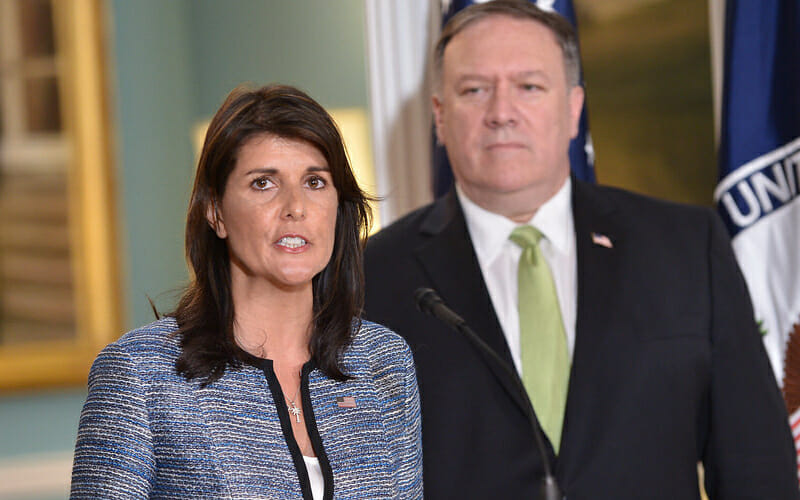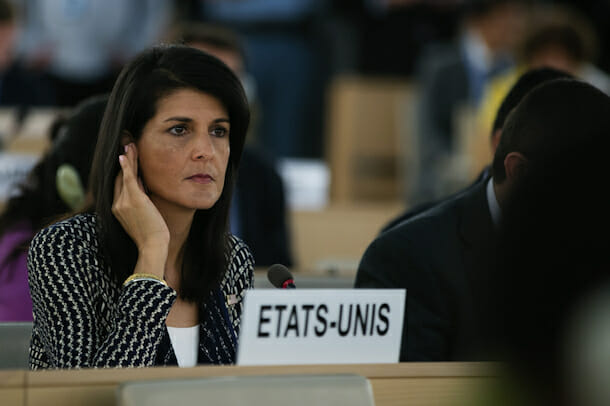
Better to be Inside the Tent Looking Out
The Trump administration seems intent on hastening America’s retreat from the global stage, last week withdrawing from the United Nations Human Rights Council (UNHRC) amid allegations of hypocrisy and anti-Israel sentiment within the institution. U.S. Ambassador to the UN Nikki Haley insisted that America’s respect for human rights keeps it from remaining a part of a “hypocritical and self-serving organization.” If the Trump administration really meant to pursue change, however, Washington would be far better off remaining a member of international agencies so as to reform them from within.
Last week’s move by the U.S. was – quite rightly – harshly criticized by activists, more so given that Trump has already upended America’s participation in a number of multilateral agreements within the first two years of his presidency. Apart from overturning the Paris climate deal and the Trans-Pacific Partnership (TPP), he recently canceled the Iran nuclear agreement (JCPOA) too. Now, with the decision to withdraw from the UNHRC, the US is finding itself on the wrong side of history once again.
Nevertheless, this break with the UN system was no surprise. In fact, the seed was planted by the Bush administration in 2006 when it refused to seek a seat on the council in protest of the influence of repressive states. It was only through Obama’s presidency that the U.S. began to engage with human rights as a multilateral challenge. That commitment importantly included the explicit intent to push for reforms of the wider UN human rights system, as famously proclaimed by then-Secretary of State Hillary Clinton. However, with the election of Trump, Obama’s dreams of a “new era of engagement” seem to have been short-lived.
This is a shame, because it’s without question that UNHRC is in real need of reform. Criticism has usually focused on the group’s collective blind eye in accepting as members countries with poor human rights records – a fact that the Obama administration was acutely aware of. In the decade since, the UNHRC has mutated into the beast that Trump now feels confident in leaving behind. While the majority of the 47 rotating members have been free, democratic countries, notorious human rights violators like Venezuela, Saudi Arabia, Russia, China, Indonesia and Cuba have all held a seat on the council.
Even so, Trump’s attitude that the UNHRC is “hopelessly compromised” is rendering futile hopes for a concerted reform effort. Worse, the defeatist attitude is dangerously misguided: as the most powerful player in the UN system, Washington would have been better off leveraging its political weight to mold the UN apparatus to its preferences as much as possible. Retaining its seat and concurrent engagement with the international community could have allowed for leading the debate from within, possibly to great effect.

Trump and Haley could have easily realized this had they not been blinded by selfish ignorance. The U.S. has shown on multiple occasions its capability of leveraging its power within organizations to force dysfunctional organizations to confront and explain their shortfalls. In fact, it is currently doing so in the case of the International Agency for Research on Cancer (IARC), a research body under the World Health Organization (WHO) umbrella. IARC has been under fire for years for its controversial studies labelling common substances carcinogenic – including coffee, the widely used herbicide glyphosate and fried meat.
This month, the U.S. House of Representatives referred to IARC as an “affront to scientific integrity” over evidence that IARC scientists had systematically ignored studies contradicting their own assessment of glyphosate being carcinogenic. As a consequence, IARC remains the only international scientific body categorizing the herbicide as carcinogenic, despite the Environmental Protection Agency (EPA) – along with the European Chemicals Agency and European Food Safety Authority (EFSA) – reaching markedly different conclusions.
To explain such discrepancies between IARC’s and international assessments and the shed light on the allegations of unclean scientific work, U.S. Congress has called on the incoming IARC chief Elisabete Weiderpass to testify before a committee in order to “better understand” how she would improve management of the agency. Failure to do so could have severe consequences, as U.S. lawmakers have threatened to withhold funding for IARC in that case. Through the National Institutes of Health (NIH), the U.S. government is major donor to IARC – a donor whose loss the organization can hardly afford.
But even the UN can be nudged to alter its ways if the U.S. pulls its weight from within. On May 31, the UN General Assembly approved a 2019 reform program to the tune of $255 million for a more transparent and efficient system. The U.S. was a key driver behind these changes and their general approval is no doubt the result of U.S. pressure.
What these examples show is that Washington’s active participation in the bodies of international organizations, UN or others, is pivotal if the status quo is meant to be broken and renewal is to follow. The lesson must be heeded that if the U.S. has any hope of reforming the global human rights agenda and the institutions that serve it, exiting the UNHRC is a step in the wrong direction. After all, no one likes a quitter, and few pay much heed to outsiders. To paraphrase an astute observation by J. Edgar Hoover, it is better to be in the tent looking out.

